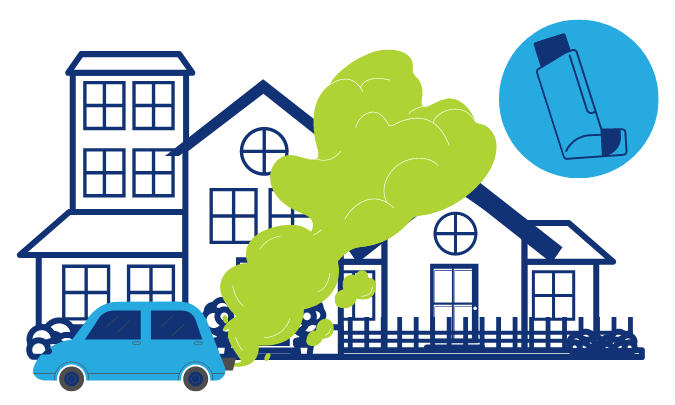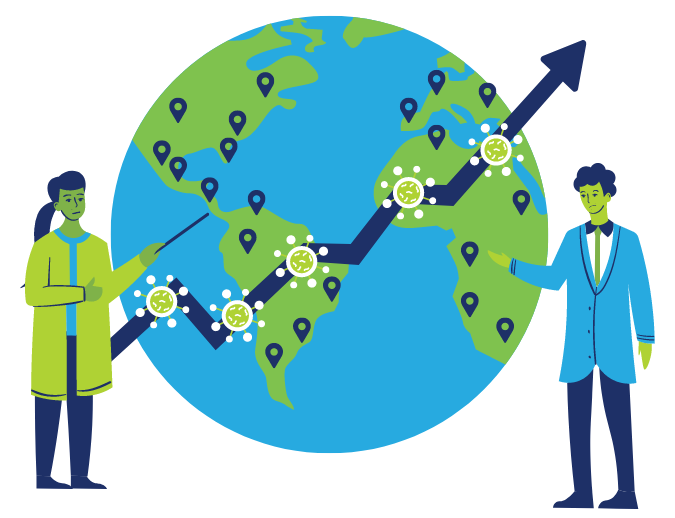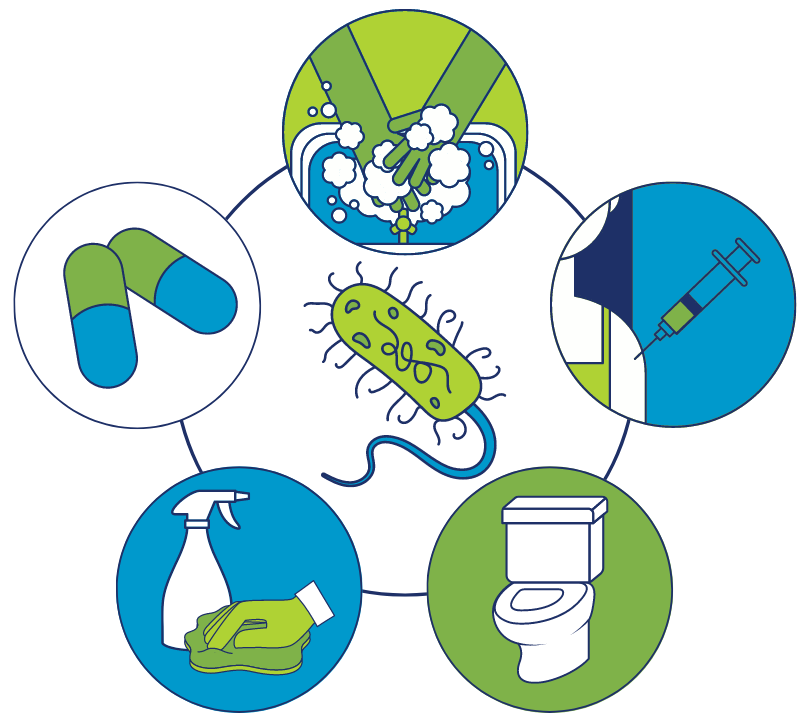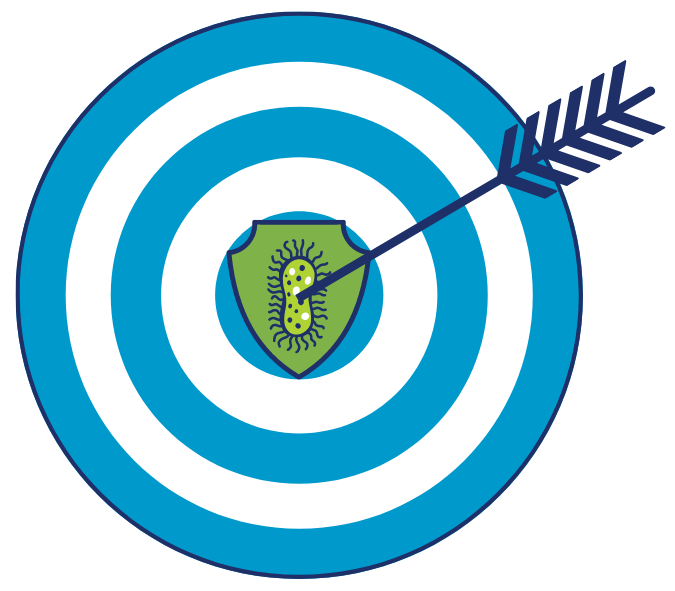
While innovative and effective ideas to help solve major global health problems are hard to come by, finding and attaining funding to put them into action can be even more difficult. The research grant review process takes time and can be bogged down in red tape. Decisions on who and what kind of research gets funded can pass over novel ideas in favor of familiar project plans.
The Trinity Challenge aims to shake things up a bit by rewarding creative and practical ideas that take research down to the community level. While the first round was dedicated to addressing COVID-19, the latest prize will go to ideas to fight the emergence and spread of drug-resistant infections, otherwise known as antimicrobial resistance (AMR).
In this episode of One World, One Health, Dr. Marc Mendelson, Professor of Infectious Diseases and Head of the Division of Infectious Diseases & HIV Medicine at Groote Schuur Hospital at the University of Cape Town and director of the Trinity Challenge tells us how the Trinity Challenge aims to support researchers with ideas to fight the present and growing problem of drug resistance in new and inclusive ways.
Maggie Fox 00:01
Hello and welcome to One World, One Health where we talk to people working to solve some of the biggest problems facing our world. I’m Maggie Fox. This podcast is brought to you by the One Health Trust with bite-sized insights into ways to help address challenges such as infectious diseases, climate change, and pollution. A One Health approach recognizes that everything on this planet, the animals, the plants, and people, and the climate, and environment are all linked.
It’s easy to get people to complain about things, but how do you encourage folks to come up with solutions? One surefire way is to offer a prize. There’s a newish one for global health called the Trinity Challenge. The first challenge in 2021 asked for data-driven solutions to predict, respond to, and recover from pandemics. It paid out about 8 million in US dollars to eight different submissions.
In this episode, we’re chatting with Dr. Marc Mendelson, Professor of infectious diseases at the University of Cape Town in South Africa. He is also director of the Trinity Challenge. Marc, thanks so much for joining us.
Marc Mendelson 01:11
Thank you.
Maggie Fox 1:14
Marc, we could talk about infectious diseases forever, but you help launch a project that takes some specific approaches. Can you tell us about the Trinity Challenge and what it does?
Marc Mendelson 1:24
The Trinity Challenge is a UK charity that was set up by (Dr.) Dame Sally Davies, who’s the master of Trinity College, Cambridge, and the UK special envoy on antimicrobial resistance. And she set up the Trinity Challenge in 2021. In response to the real understanding that although an enormous amount of data analytics was coming out of the COVID pandemic, there were not a lot of implementations for better policy, and action. So, she set up the challenge, which ended up with a 5.7 million pound prize fund to challenge people to find solutions in multidisciplinary teams that would either help predict, detect, or respond to pandemics.
It was an extremely successful challenge. We had eight wonderful winners, who now receive post award support, and their solutions are being implemented on national, and even regional scales. So, Dame Sally has set the UK Special Envoy to antimicrobial resistance, and has been working in this important field of pandemic for the last 10 to 15 years. And with anchor funding from the Wellcome Trust, she was able to secure this funding to set (up) a second Trinity Challenge, and this time, it is the Trinity Challenge on antimicrobial resistance.
Maggie Fox 2:43
Can you tell us about some of the winners?
Marc Mendelson 2:46
The grand prize winner, the first prize winner for the inaugural Trinity Challenge was a group from Thailand, Participatory One Health Digital Disease Detection (PODD), and they had an amazing solution, they developed an app for Thai farmers. And the idea was that because many pandemics, and particularly we think (the) COVID pandemic started from a spillover event, in other words, an infection from an animal into humans, the idea of how we might be able to detect potential spillover events, and therefore try, and prevent pandemics for the future was to develop this app (that would) allow the Thai farmers then to take a photo of any of their sick animals that would then feed into a central surveillance system, and a reflex would be initiated where there would be people coming out to look at the animals, and to do an investigation.
And this was extremely successful and is now not only in Thailand, it was in 17,000 Thai farmers initially, but this has now extended not only in Thailand, but within the region as well.
On the other end of the scale, there was a solution called BloodCounts from (the) University of Cambridge. BloodCounts took usually discarded data from when you have a blood sample taken to check your full blood count. And particularly when (a) blood donation is given, a full blood count is done. Usually doctors just see 10 or 11 different parameters around that blood, which helps us to diagnose disease, but a lot of the information laser data is discarded, and they use artificial intelligence machine learning to take that discarded laser data, and be able to predict where the source of COVID outbreaks could be occurring. So again, an amazing solution but very much different from the PODD, but (it is) a solution that could allow (the) detection of future pandemics.
Maggie Fox 4:39
Next up, then antimicrobial resistance, the rise of drug resistant germs — what are you looking for there?
Marc Mendelson 4:45
So, the goal there is again (to) use innovation in data and analytics to try and change the course of any really important public health crisis (like) a pandemic which is the resistance of bacteria to antibiotics. And moreover, it’s to try, and tend to a major gap in our knowledge. So almost all the data that we use to make decisions around antibiotic resistance, both nationally and globally, comes from data that is derived from hospitals. So, the laboratory tests that are done in hospitals on the bacteria, and so it’s mainly people who are admitted to the hospital. Now those people are a selected group of the population.
But what we have very little data on is what’s actually happening at the community level. Now antimicrobial resistance is a problem of One Health. In other words, it affects humans, it affects animals, and (it) affects the environment. And the other major gap is that we tend to have much more information around what’s happening to humans, and far less information around what’s happening in food production systems, and in environmental bacteria, where everything is connected because environmental bacteria get into food chains, and humans, animals, etc.
So again, we’re looking at the community level; that’s our focus for the Trinity Challenge. And the other focus, which is the main gap is (that) it’s focused on low- and middle-income countries. The hospital data that we have predominantly comes from high income countries in the global north. And what is lacking is data from the low- and middle-income countries of the global south. So global south countries’ community-level data across the One Health sector is the initial focus of this Trinity Challenge and where we’re looking for innovation in data analytics.
Maggie Fox 6:32
You are really stressing data and evidence, which is so important in these days of people using opinion and belief to try to battle facts.
Marc Mendelson 6:42
Absolutely! I mean, the evidence base is critical. And, you know, acknowledging the fact that the data is lacking in low middle income countries, and the community level, we hope to fill that gap. And that’s important because when you’re making decisions about what type of antibiotics to use and what type of antibiotics we need, if we’re looking at a very biased sample of people who are very sick, often go into the hospitals, (they) develop infections in the hospitals with bacteria that reside in hospitals that are highly drug resistant. Is that the same as what’s happening at the community level?
Say you go to a clinic with a cough that actually does require antibiotics, or you go with a urinary tract infection that does require antibiotics. Do you need the same antibiotics as you might in a hospital? Almost certainly not! But without good data generation and understanding, we don’t know that in food production systems, what is the real level of antibiotic resistance in important bacteria that can cross from animals to humans? And again, in the environment, we have very little understanding of the interplay with the environmental sources – what is the best source and the environment.
During COVID, we saw that wastewater was critical to our understanding of how outbreaks, and community transmission, and then hospitalizations actually worked. So, if the wastewater was being surveyed and COVID was found, then that would predict two weeks later that the community would start seeing cases of COVID. And two weeks after that, we would see the severe COVID cases being admitted to (the) hospital. So, it allowed (for) planning. Is that the same for AMR? Can we use wastewater? Or is it effluence from farm slurry?
There’s been an amazing paper that looked at cloud samples from an atmospheric research station atop Puy de Dome summit, a dormant volcano in central France, knowing that the cloud samples were carrying drug-resistant bacteria with many different types of drug-resistant genes. So again, it’s this sort of innovation in how and where we collect data from.
And, I guess, it’s also about where’s the innovation in existing datasets; we may have existing datasets that just aren’t being used in (a) normative way. And therefore, the Trinity Challenge on antimicrobial resistance really has three major components that we are interested in looking at, apart from, you know, the focus, and those are innovation, integration, and implementation, known as the buzzwords, that really center the focus of the challenge.
So, when we’re talking about innovation, as I said, it’s where are the sources of data and how we analyzing them? Is it whole genome sequencing? Is it another type of analysis, new or existing? Who are the people who could collect this data?
We saw, as I’ve mentioned, with our winner from the inaugural challenge that were farmers. So, who were the citizen scientists out there who we could tap into? So that’s the innovation side, we also believe that there’s an awful lot to be learned from another gap in terms of (why) we don’t integrate either existing datasets or, in fact, hopefully these new datasets we might find with citizen related data. And when we talk about citizen related data, that’s data that’s being collected about us continuously, though it’s mobility data. It’s health metrics, it’s climate data.
And again, during COVID, we saw the power of this. So, for example, there were a number of studies looking at mobility data, which was able to then show how people were accessing and where they were accessing vaccination centers or diagnostic tests to help in implementing better policy. So that’s one part: could mobility data be an answer to our understanding or improving our understanding of how humans access antibiotics where they’re accessing it from? You know, there are many countries we think don’t allow access to antibiotics over the counter? Is that true? Can we use mobility data to perhaps think about that and how farmers access antibiotics for their animals?
So that’s how (some) sort of mobility data might be used climate data, obviously, climate temperatures, flooding — all these different climactic events could have implications on antimicrobial resistance and on supply chains. Antimicrobial resistance is such a huge, complex problem that there are so many opportunities to improve our understanding of what’s happening at community level. And then, lastly, we obviously (know) that we’re looking for solutions that will allow us to implement better action and policy change, just as we saw during the inaugural challenge, and many solutions did come forward in the pandemic.
Maggie Fox 11:07
So why offer a prize? Is there some kind of psychology involved there?
Marc Mendelson 11:12
Yes and no! I think the importance of this challenge methodology, I mean, a prize, we’re talking about funding, obviously, and traditionally, academia and other groups are funding through research calls. And it is often very sort of siloed and very narrowed, focused; the challenge methodology really generates multidisciplinary working, multidisciplinary functioning, and of course, to be able to develop the solutions, it requires money.
So, it’s not really a psychology, you know, it’s not a prize, where it’s a trophy, it’s a prize, you know, up to the first prizes, up to a million pounds of funding. And the teams need that funding to be able to develop the solutions, to test their solutions, depending again, on what that type of solution is, which could be all the way from proof of concept to globalizing an already useful solution. So that’s why there’s a prize.
Maggie Fox 12:04
How are you measuring your success? Or do you even have to do that?
Marc Mendelson 12:09
You do have to measure success. Absolutely. We are going to be using the same model as we used for the inaugural challenge. So once the winners were announced for the inaugural Trinity Challenge, we then went into a phase of post award support. So we’ve partnered with Jhpiego, the Johns Hopkins (University Affiliated) accelerator, who are giving support to each of our eight winners, their teams, and that goes all the way from, you know, making connections to trying to help in terms of finding implementation funding to supporting them as a group for innovation for further funding calls.
So, we measure it, and then we know what the success is. Honestly, there’s sort of time on academic measures of success through publications, and presentations. But we’re also looking to see how those solutions impacted the health landscape and pandemic preparedness. And we’ll be using the same sort of criteria for the second Trinity Challenge.
Maggie Fox 13:04
So, it’s not just one and done, you’re really keeping up with this over time?
Marc Mendelson 13:09
No, absolutely. We are definitely not one and done. We’ve been through Jhpiego. And with our partners, we’ve had an innovation showcase since the winners were announced. And that was a very successful showcase of how the winners had propagated their solutions and forwarded their work.
And again, that was also with a view to implementation funding. The Trinity Challenge this time has built a coalition of partners, which are partners, again, who are funders, but also many different companies, foundations, etc, have given in-kind support. And a number of those members have been supporting (the) Trinity Challenge winners in their solutions. And that could be with data, or with funding, or with advice, etc.
And that again, we’re building again a steering committee, a coalition, and that will be taken forward for our second Trinity Challenge.
Maggie Fox 14:03
Well, I look forward to seeing who wins the antimicrobial resistance or the antibiotic resistance challenge. Marc, thank you so much for spending some time with us.
Marc Mendelson 14:13
Thank you, Maggie. Thank you very much, listeners.
Maggie Fox 14:17
If you enjoyed this podcast, please share it. You can learn more about this podcast, and other important topics at onehealthtrust.org. And let us know what else you’d like to hear about at [email protected]. Thanks for joining us.
Guest

Dr. Marc Mendelson is the Director of The Trinity Challenge and a full Professor of Infectious Diseases at the University of Cape Town, South Africa. Marc is a UK-trained clinician scientist, who has worked for over 20 years in Cape Town as head of the Division of Infectious Diseases and HIV Medicine. He led the development of South Africa’s Antimicrobial Resistance Strategic Framework and chaired its Ministerial Advisory Committee from its Inception in 2014 until 2023. Marc has served as president of both the Federation of Infectious Diseases Societies of Southern Africa and the International Society for Infectious Diseases. He is the South Africa PI for the CAMO-Net (the Centre for AntiMicrobial Optimisation Network) and works with international partners including WHO, GARDP, Vivli, Wellcome Trust, and WEF on AMR.
Credits
Hosted and written by Maggie Fox
Special guest: Marc Mendelson
Produced and edited by Samantha Serrano
Music composed and sound edited by Raquel Krügel
Transcript edited by Astha Singh







